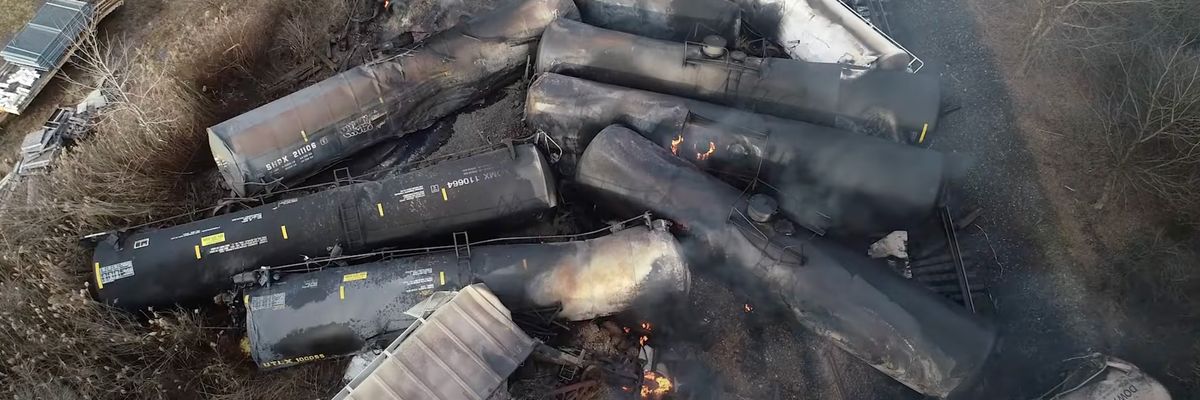The U.S. Environmental Protection Agency announced Thursday that it had begun the process of prioritizing vinyl chloride for evaluation under the Toxic Substances Control Act.
Vinyl chloride, which is primarily used to make polyvinyl chloride (PVC) plastic, was one of five chemicals the agency earmarked for a risk assessment. The move comes eight months after a disastrous train derailment in East Palestine, Ohio, which included five cars carrying 115,000 gallons of the dangerous chemical.
"We have seen firsthand what vinyl chloride can do to a community," Hilary Flint, vice president of Unity Council for the East Palestine Train Derailment and director of communications and community engagement for Beaver County Marcellus Awareness Community, said in a statement.
"This is a step in the right direction, and we will continue to fight for a total vinyl chloride ban," Flint continued. "We want to make sure what happened after the East Palestine train derailment is the last vinyl chloride disaster in the United States."
Vinyl chloride is a known carcinogen that has been linked to liver, brain, lung, and blood cancers. It can also harm the neurological system and suppress immunity. Despite this, it is one of the most produced chemicals by volume in both the U.S. and internationally. In 2019, billions of pounds were manufactured in the U.S. alone.
"Most vinyl chloride is used to make polyvinyl chloride (PVC) plastic, which poses significant health and environmental problems that have been known for over 50 years," Judith Enck, president of Beyond Plastics and former EPA regional administrator, said in the EPA announcement. "This is one of the most important chemical review processes ever undertaken by the EPA."
"The examination of all routes of exposure prescribed by the law will lead EPA to the conclusion that vinyl chloride is far too dangerous to make or use, and should be banned."
A TSCA review will require the EPA to assess all the ways people can be exposed to vinyl chloride, both in terms of what it can pollute and how the exposure can take place. That means looking at how it contaminates soil, air, and water and how it impacts workers, frontline communities, and communities exposed during disasters like the East Palestine derailment. A full 27% of the people who live within three miles of a facility where vinyl chloride is used or made are children, and the evaluation will require the EPA to consider how the chemical impacts young people specifically.
Liz Hitchcock, director of Toxic Free Future's Safer Chemicals Healthy Families federal policy program, said the EPA's decision was "welcome news."
"The examination of all routes of exposure prescribed by the law will lead EPA to the conclusion that vinyl chloride is far too dangerous to make or use, and should be banned," Hitchcock said.
The other chemicals that the EPA will assess are acetaldehyde, acrylonitrile, benzenamine, and 4,4'-Methylene bis(2-chloroaniline) (MBOCA). Four out of the five chemicals are used in plastic production and all of them are used to make petrochemicals.
The EPA now has 12 months to determine whether or not the five chemicals are "High Priority Substances," after which it will begin the risk evaluation. The public will be able to comment on all of the chemicals.
"We applaud EPA for echoing states' concerns about the threat of vinyl chloride and PVC to communities. This action, along with action by states to restrict the use of PVC in packaging and building materials in favor of safer materials, will help communities thrive," Sarah Doll, national director of Safer States, said in a statement. "The urgency of vinyl chloride's threat means we need action from all levels of government."

